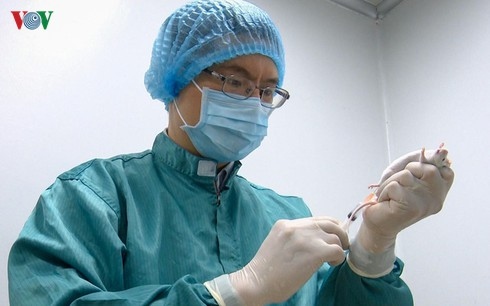COVID-19 strain found in Da Nang won’t impact Vietnamese vaccine study
VOV.VN - The latest mutation of the novel coronavirus (COVID-19) found in Da Nang will not affect the gene pool selected by Vietnamese researchers for antigens and vaccines, according to experts.
This comes after the central city of Da Nang continues to witness the complicated developments of a fresh COVID-19 outbreak, with more new cases being recorded in the community after they spread to other localities, including Hanoi and Ho Chi Minh City.
So far with scientists unable to identify the original source of infection, known as F0, the virus causing the COVID-19 in Da Nang has also been identified as a fresh strain emerging in the nation, with one of its characteristics being it spreads faster than previous ones.
Upon assessing this new strain of the virus emerging in Da Nang, experts say that the variation of the virus does not come as a surprise and it also serves to explain why the rate of COVID-19 infection is rapidly increasing globally, with the same strain also being reported in several countries around the world.
According to Dr. Do Tuan Dat, chairman of Vaccine and Biological Products No. 1 Company VABIOTECH under the Ministry of Health, with RNA viruses such as SARS-CoV-2, the virus always comes in different variants.
“Previously, it took at least one to two weeks for the number of new cases to increase to 1 million, then there were 1 million new cases in just a week, and now, a country can see the number of infections reach the 1 million landmark in maybe only five days,” Dr. Dat notes.
Dr. Dat states that the rapid spread of the virus has caused scientists to question whether the virus is mutating or not. To date, the mutations of the virus have yet to affect the gene pool Vietnamese researchers have selected for antigens and vaccines.
The virus itself will likely witness mutations and is evaluated based on two clinical characteristics, mainly the new virus is likely to spread faster. Another factor when genetic tracking is to look for hereditary changes, most importantly, researchers must select stable and the least mutated genome region, he adds.
The urgent need to develop a vaccine to cope with the global pandemic remains a major story as in a very short time the world will require billions of doses, with even the leading manufacturers only able to produce hundreds of millions of doses over a few months, according to the VABIOTECH leader.
Researchers worldwide are therefore racing against time to solve the "pandemic vaccine problem", with a normal factory having the capacity to produce tens of millions of doses of a vaccine per year, although the question is a technological matter over the need to meet the production of billions of doses of vaccine in just a few months.
Dr. Dat also went on to emphasise that researchers must also attempt to identify production capacity in order to prioritise vaccines for those most vulnerable and prepare for future scenarios in which they will be delivering vaccines to the wider community.

